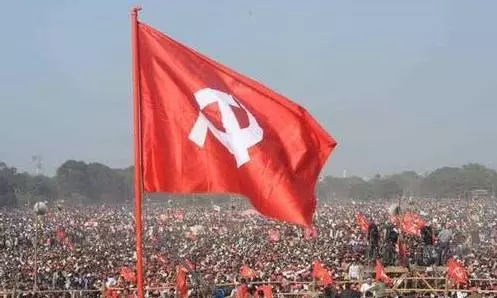
Political resolution pointing to the weakening communist movement
text_fieldsThe draft political resolution for the CPIM’s 24th party congress that politburo members Prakash Karat, Tapan Sen and Ashok Dhawle have released shows no change in the party’s political stance, while emphasising on strengthening its independent plank. Although members and party constituents can suggest amendments to this resolution till March 5, no fundamental changes are expected. The political resolution approved by the 23rd party congress held in Kannur in 2022 had no fundamental changes. Despite the BJP fell short of absolute majority in the 18th Lok Sabha elections the front led by the extreme Hindutva party is still in power. The major setback in polls has not persuaded the BJP to make any changes in its political stands. But the party has decided to go ahead with goals such as one nation, one election, one civil code and complete control of waqf properties. On the other hand, nevertheless pulling off major achievement that shocked the extreme right wing, the India Alliance has shown weakness in continuing its journey with the same determination. It must be said that the Front did not work at all in the state assembly elections that followed the Lok Sabha elections. In Haryana, the Congress did not face the elections under the banner of INDIA bloc. Although the Front worked in Maharashtra, the results were disappointing. The CPM’s political resolution makes it clear that the party will continue to be part of the Opposition front, and will try to form a broad front by bringing in more regional parties. However, it is not clear which regional party outside the INDIA bloc the party is targeting. Within the Front itself, the CPIM is the main adversary of the ruling Trinamool Congress in West Bengal. Its understanding with the Congress there did not yield the CPIM any gains. The CPM has resolved to continue its strong opposition against the Sangh Parivar. It remains to be seen how the Left parties, very weak as they are in the Hindi belt dominated by the Sangh Parivar, is going to pull off it. The left parties are almost extinct in states including UP, Bihar and Andhra, where the undivided Communist Party was fairly active post-independence. In Bihar, however, the CPI-ML Liberation, which both communist parties kept at bay in the name of extremism, is relatively holding ground. The dilemma and shortcomings that the communist movement has faced since its inception in terms of how to deal with the caste system, a crucial force in Indian social life, remain unchanged even three-quarters of a century after independence. The new political resolution does not throw any light on this matter. The working-class parties are not only groping in the dark in today’s India, where global capitalist monopolies have taken complete control, but are also forced to take positions to humour corporate giants in the only state they are in power.
The resolution blames that Muslim fundamentalist and extremist organizations including Jamaat-e-Islami and SDPI are trying to increase their influence among the Muslim population, while undercutting CPM’s clout amongst them in Kerala. However, the resolution admits that minority extremism cannot be compared to the Hindutva forces in power. The party believes that their role in promoting majority extremism cannot be ignored. The party admits that the Muslim minority supported the Congress, which fronted INDIA bloc, to defeat the Hindutva extremist forces in the Lok Sabha elections. The contradiction in blaming the Muslim orgnisations that had taken same stand in Kerala is evident in the resolution. These organizations have not decided or announced their stand in the assembly elections. Given this, the party has the responsibility to explain why its leaders from the Chief Minister to the branch secretaries attacked the organizations mentioned by name more intensely than Hindutva outfits during public meetings related to the party’s branch-area-district conferences. The leaders and spokespersons of the party are repeating the allegations like how Skheera bala is made without explaining what minority communalism is and how the alleged organizations express it.It is as clear as day that it is not the speeches or activities of Muslim organizations but the baseless allegations and propaganda of those including the Chief Minister are strengthening the majority communalism. The party should have opened eyes to the laminations of the party ranks that the party in its eagerness to gain minority support joined hands with Muslim outfits in agitations on issues including like citizenship and Palestine, which backfired causing adverse effect on the majority community. However there is no adequate suggestions in the resolution to identify the disease and treat it or correct the shortcomings. The weakening of the left movement which was once strong in the country cannot be considered auspicious at this critical juncture, for whatever reason.























